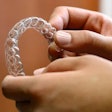
The Board of Dental Examiners of Alabama has agreed to settle charges filed by the U.S. Federal Trade Commission (FTC) accusing it of violating U.S. antitrust law by unreasonably excluding cheaper teledentistry providers from competition.
The state dental board has agreed to stop requiring licensed dentists to provide onsite supervision during oral scanning of patients seeking tooth straightening treatment, such as clear aligners, according to the FTC.
"The Board must no longer impede clear aligner platforms, or dental professionals affiliated with them, from providing clear aligner therapy through remote treatment," the commission stated in a release issued September 28.
For the past several years, teledentistry clear aligner companies such as SmileDirectClub have filed lawsuits and requested rule changes as they compete with traditional orthodontics providers. In July, the U.S. Court of Appeals for the 11th Circuit upheld a panel ruling from 2020 to advance SmileDirectClub's antitrust lawsuit against the Georgia Board of Dentistry.
Despite the battles, SmileDirectClub has struck up product partnerships with Walmart and Walgreens and has continued to expand globally. Most recently, SmileDirectClub announced it is opening shops in France.
When state regulatory boards are composed of active market participants, such as dentists, they can violate antitrust law by publicizing and enforcing rules that harm competition in the industry in which board members participate, according to the FTC. Alabama's board is composed of six dentists and a dental hygienist.
In 2017, the board, which is tasked with issuing licenses in Alabama, amended its rule, prohibiting any dental team member from taking digital scans without having a licensed dentist physically present to supervise, according to the complaint. Dental hygienists and other nondentists routinely take these scans.
The FTC said the board only changed its rule after clear aligner teledentistry platforms SmileDirectClub, Candid, and Smilelove began offering lower cost treatment in Alabama. The amended rule contradicted the business models of the clear aligner platforms, where dental hygienists and assistants took digital scans of patients while dentists supervised remotely, according to the complaint.
After the dental board sent a letter to SmileDirectClub that demanded it stop using nondentists to take digital scans, the clear aligner platform abandoned its plans to open more locations in Alabama, the FTC noted.
To settle the charges, the board agreed to no longer impede teledentistry platforms or affiliated dental professionals from providing clear aligner therapy through remote treatment, according to the signed consent agreement.
Also, the board must alert the FTC about any changes to its rules related to intraoral scanning or clear aligner platforms, according to the agreement. The consent agreement will be published in the Federal Register soon, the FTC stated.




















